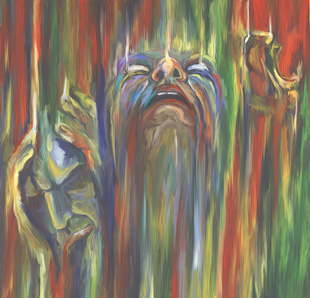Inspirational Quotes
"I have learned that people will forget what you said; people will forget what you did, but people will never forget how you made them feel."
--Maya Angelou
"Live as if your were to die tomorrow. Learn as if you were to live forever. You must learn to be still in the midst of activity and be vibrantly alive in repose."
--Gandhi
What Does Bipolar Mean?
Over 5 million Americans suffer from Bipolar Disorder.

What does Bipolar mean? Bipolar, or Bipolar Disorder, is a psychiatric condition of extreme mood swings that affects 1 out of 45 Americans in the US, according to a recent study by Ronald Kessler and author of "Prevalence, severity, and comorbidity of twelve-month DSM-IV disorders in the National Comorbidity Survey Replication (NCS-R).
Also known as manic-depressive disorder, this condition disorder belongs in the category of mood disorders and defined by alternative episodes of elevated emotion and depression.
The episodes of elevated emotion are also known as mania. Also known as hypomania, which is a milder form.
The following information is taken from the Diagnostic and Statistical Manual 4th Edition (DSM-IV) and the National Institute of Mental Health (NIMH), and some of it is taken ad verbatim:
Bipolar types
Bipolar Disorder has been broken down into two types:
Bipolar I
Bipolar II
- A manic episode is an intense high where there is an inflated sense of self-esteem or grandiosity, a decreased need for sleep, high distractibility, and excessive involvement in pleasurable activities.
- They may be more talkative than usual, experience racing thoughts, and become easily agitated.
- Medication, such as Lithium, is typically prescribed for this disorder and is the corner stone of treatment.
- Therapy can be useful in helping the client understand the illness and it’s consequences and be better able to know when a manic or depressive episode is imminent and to prepare for this.
- As with all disorders, poor coping skills and lack of support will make the illness more pronounced, and this is often a focus of therapeutic treatment.
Jim Carrey
Sinead O'Connor
Ozzy Osbourne
Nicola Paget
Wolfgang Amadeus Mozart
Vincent Van Gogh
Ludwig Van Beethoven
The Heart Brake of a Break Up
A Couple With Good Stress Tolerance Lasts Longer
Mental Health: It All Starts In You
Bipolar I: For a diagnosis of Bipolar I disorder, a person must have at least one manic episode within the last two months.
Mania
Although it can seem enticing, a single manic episode can lead to activities with a high potential for painful consequences. Some of them might include engaging in on-the-moment buying sprees, sexual promiscuity, and careless business investments.
Depression is often experienced as the high quickly fades and as the consequences of their activities becomes apparent, the depressive episode can be exacerbated.
Bipolar II: Similar to Bipolar I Disorder, there are periods of highs as described above and often followed by periods of depression.
Bipolar II Disorder, however is different in that the highs are hypo manic, rather than manic. In other words, they have similar symptoms but they are not severe enough to cause marked impairment in social or occupational functioning.
Treatment
Prognosis
With medication, the illness can be kept at a minimum level.
Some people may not experience any overt symptoms for months and even years.
For more severe cases, prognosis is poor in terms of ’curing’ Bipolar, as most people need to remain on medication for their entire lives. The manic episodes may slow down as a result of the natural aging process.
However, there are definitely varying degrees of this illness and it is not difficult to misdiagnose due to it's similarity to other mood disorders.
If the illness is not severe, often times medication and therapy can do very well in terms of treatment. And, life experience, strong support, and an openness to improve can be enough sometimes to make a difference in outcome.
Famous people with Bipolar Disorder
This chronic condition is also seen by many as a source for artistic talent and creativity.

There are several celebrities and artists who are open about having Bipolar or Bipolar related sysmptoms. This list includes:
There are also deceased artists who are thought to have had Bipolar, such as:
What does Bipolar mean to the person who has it?
Most people with Bipolar feel isolated, confused and exhausted. However, they benefit enormously from quality support from family and friends.
Individuals with Bipolar Disorder often need medication management, and also benefit from long term therapy and participating in support groups.
Counseling is vital in controlling the symptoms of Bipolar. Your therapist can help you learn techniques that can make you more aware of the signs and symptoms, and how to try to keep them under control.
Current News and Updates
If you are interested in the latest news on Bipolar Disorder, then please visit the following links. You will find breaking news and headlines on Bipolar updated daily.
Related topics
Please visit the following links:
Online Citations
Bipolar Disorder. National Institute of Mental Health (NIMH)
Citations
American Psychiatric Association. Diagnostic and statistical manual of mental disorders: DSM-IV. Washington, DC: American Psychiatric Association, 1994; 388-397.
Havens, L. L.; Ghaemi, S. N. "Existential despair and bipolar disorder: The therapeutic alliance as a mood stabilizer". American journal of psychotherapy, 2005; 59 (2): 137–147.
Updated: May 4, 2012
Article created: September 10, 2010
BACK TO TOP
Anxiety & Panic
Autism
Bipolar Disorder
Depression
Eating Disorders
Personality Disorders
PTSD
Schizophrenia
Sexual Issues
Sleep Problems
Stress
More...
![]() This site complies with the HONcode standard for trustworthy health information:
This site complies with the HONcode standard for trustworthy health information:
verify here.
Copyright © 2013 Psychology One. All rights reserved. This site is for education & information purposes. This site is not a substitute for professional psychological, medical or psychiatric treatment.